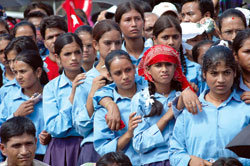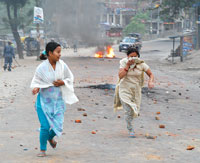|
|
Over 400 children killed. More than 8,000 orphaned. Around 40,000 displaced. Close to 29,000 abducted.
A generation of Nepali children has been crippled physically and psychologically by the decade-long conflict, as these figures from Child Workers in Nepal suggest. Yet, children have failed to figure anywhere in the peace process and so far, none of the series of talks between the Maoists and seven-party alliance have managed to include children in their agenda.
On Monday, the Maoists 'asked' schools around the Valley to send their students in school uniforms to attend their ANNFSU(R)'s national assembly convention in Tundikhel. There was a huge outburst from child rights and human rights groups and the event made the headlines of newspapers, radio, and television.
But this is virtually an everyday occurrence out in the districts, especially in west Nepal, where children are abducted and forced into 'voluntary' participation in Maoist activities.
"They intimidate us and make threats if we refuse to join," says 16-year-old Shrenika Shaha from Bardiya, who is a member of Bal Adhikar Chetna Samuha, a children's group formed by Insec to help raise awareness about child rights in remote villages. Shaha explains that the rebels start out convincing children to join their political activities and become 'important' in society.
"They try to tell us that they'll turn Bardiya into Switzerland if we all work as Maoists," says 16-year-old Bardiya's Deb Bahadur Buda.
This constant intimidation has frightened some school children into submission, left others mentally disturbed, and seduced some with visions of power.
Local Maoist leaders in Bardiya and Banke say they never force their politics on children. "We are very sensitive about protecting rights of the children but how can we stop them if they are so interested in our student activities?" argues Purna Subedi, chief of the Banke's Jana Sarkar. She says accusations of child abduction and the like are merely political propaganda against the Maoists.
But talk to any of the children and parents who are willing to risk their lives to speak out against the rebels, and such claims appear as hollow as promises of a Swiss-style life.
"Every day, parents fear their children will be abducted or lured away by the Maoists," says a depairing Purna Bahadur Pokhrel, whose 15-year-old son Sushant disappeared last month after attending a Maoist student program in Nepalganj.
Pokhrel received a phone call from his son who said that he would return home only as a Maoist commander.
"I want my son back. I want the Maoists to show good faith by returning him home," pleads Pokhrel.
Violations
|
|
Children who had participated in the protest demonstrations were not spared. Nearly 224 children were severely injured, about a fifth suffering head injuries from batons or rubber bullet injuries.
David Johnson, officer-in-charge of OHCHR Nepal, appealed to the political parties to stop using children in their demonstrations, and avoid a repeat of April. "Political parties should draw up a code of conduct for demonstrations which reflects the duty to respect others, and prohibits the use of children in demonstrations," said Johnson, adding that the security forces need to be trained in child protection issues, including the rights of children not to be beaten or arbitrarily detained.
Among the other recommendations made by the rights body are strengthening the chain of command in the police, holding security men accountable, providing adequate training, and amending laws and ordinances to allow lawful gathering. In addition, those found to have violated human rights in April should be charged, says the organisation.
There are renewed fears about rights, as the new army bill is ready to be approved by parliament. Activists such as lawyer Mandira Sharma worry that the proposed law allows for impunity and immunity from prosecution for security forces.




